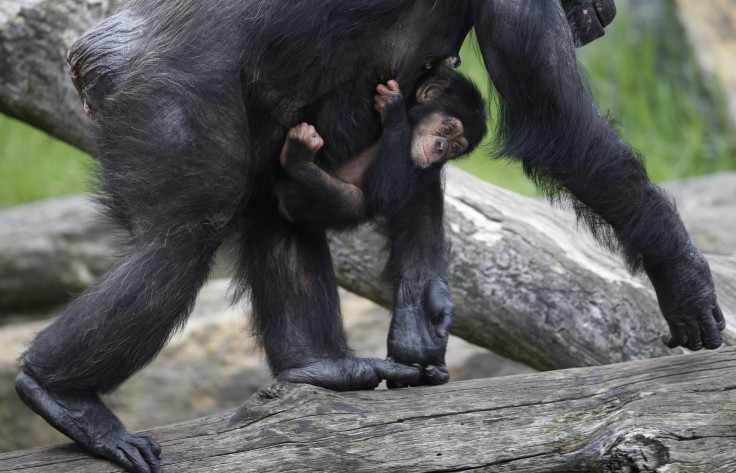Chimpanzees Have Social Norms, Show Bystander Effect: Study

Chimpanzees’ reactions to violent video footage may hold the key to understanding how human morality and social norms have evolved, a team of scientists said Thursday. Their study suggests that chimpanzees, like humans, have an innate sense of what kind of behaviors are socially appropriate.
In the study, published Thursday in the journal Human Nature, researchers from the University of Zurich videotaped two groups of chimpanzees living in separate zoological gardens while the animals were shown footage of other, unknown chimps. The control footage showed chimps performing neutral activities like walking or cracking nuts, while the experimental clips showed violent scenes, including an infant chimp being killed by its own kind, a small colobus monkey being killed by chimps, and aggressive behavior between two adult chimpanzees.
The researchers analyzed the footage to see how long the chimps looked at the screen and noted their response to the images. They found that the animals looked at the screen up to four times longer when shown the infant killing scenes compared to other violent ones.
The research showed that chimpanzees process severe aggression toward infants of their own species differently from other kinds of violence and aggression. This indicated that the violent behavior toward infants went against social expectations of tolerance among adult chimps. The researchers said it showed that chimps have their own version of the “bystander effect,” where individuals will watch a social violation but will not interfere as long as others are present.
The researchers also found that while the chimpanzees watched the infant killing scene for longer, they did not necessarily react strongly to it, suggesting that they may not take strong action if chimps from outside their group were harmed.
"The results suggest that chimpanzees detect norm violations both within their group as well as in a group of unfamiliar individuals, but that they will only respond emotionally to such norm violations within their own group," the study’s lead author Claudia Rudolf von Rohr said in a statement.
Rohr’s previous research has suggested the existence of these so-called proto social norms as well. In a 2010 study led by Rohr, researchers found that “chimpanzees exhibit a community life in which individuals repeatedly interact with each other on a long-term basis and in which harmony and stability plays a central role,” making them ideal candidates to study how complex social behavior emerges over time.
In the future, Rohr said that more research might provide insight into how human social behavior evolved over time, and why some behaviors have become widely established while others are more difficult to accept.
© Copyright IBTimes 2025. All rights reserved.





















